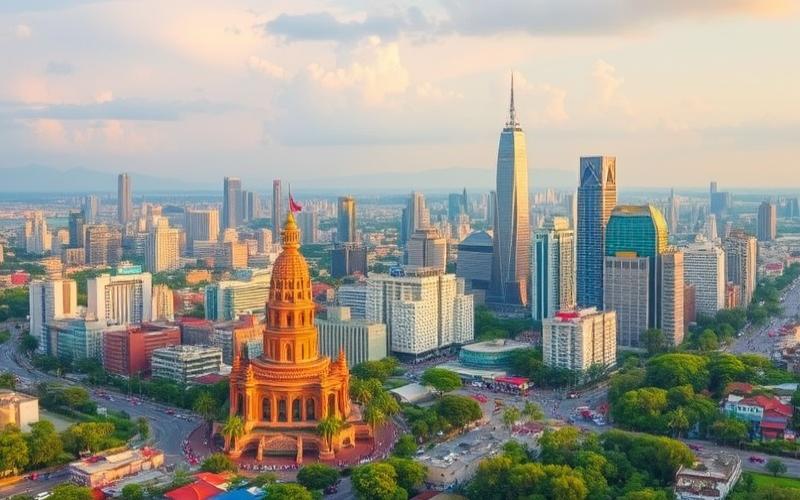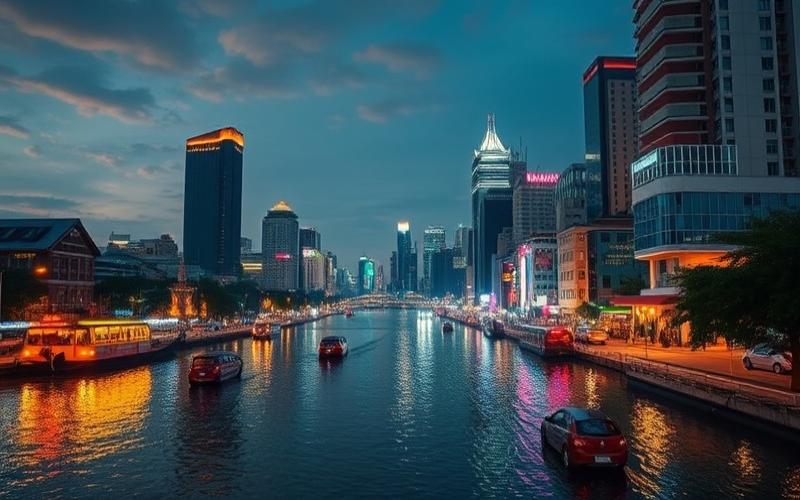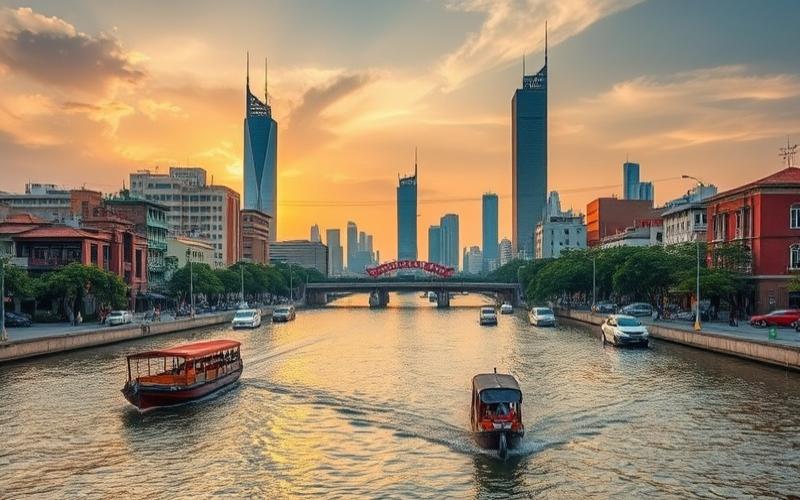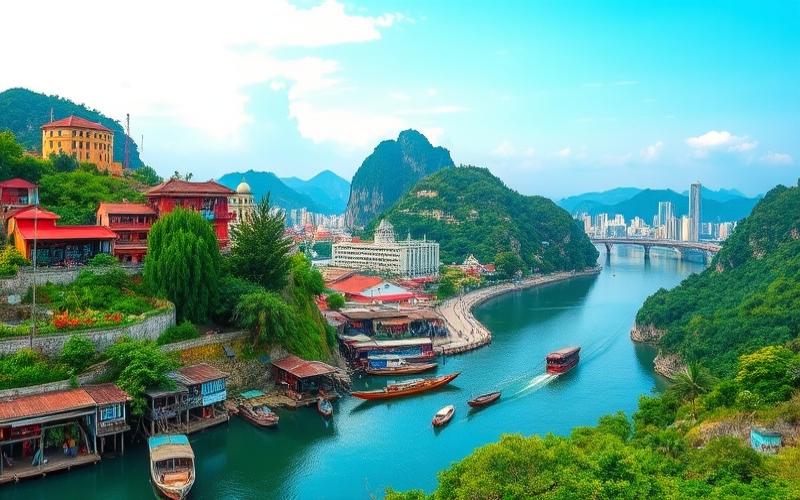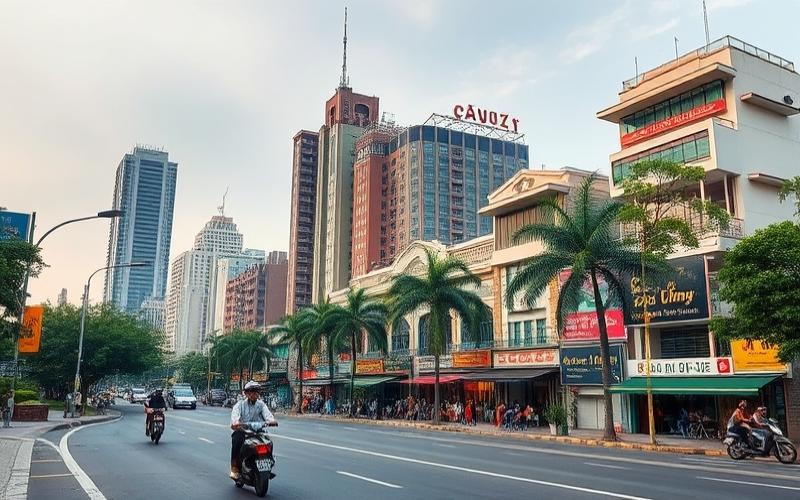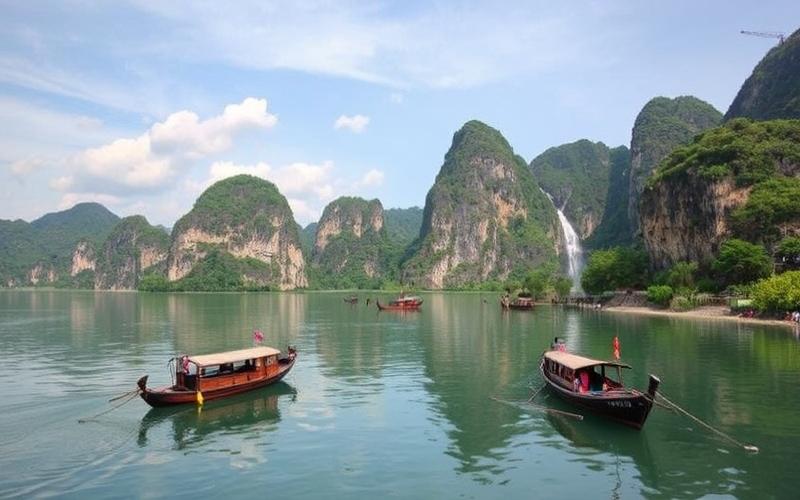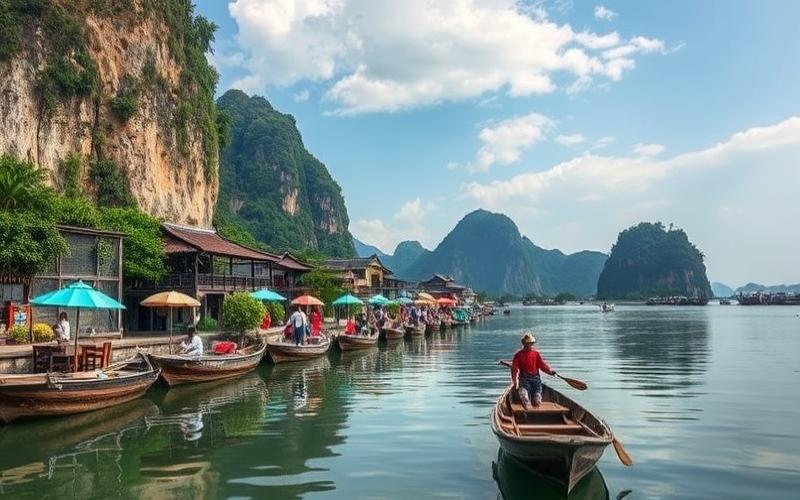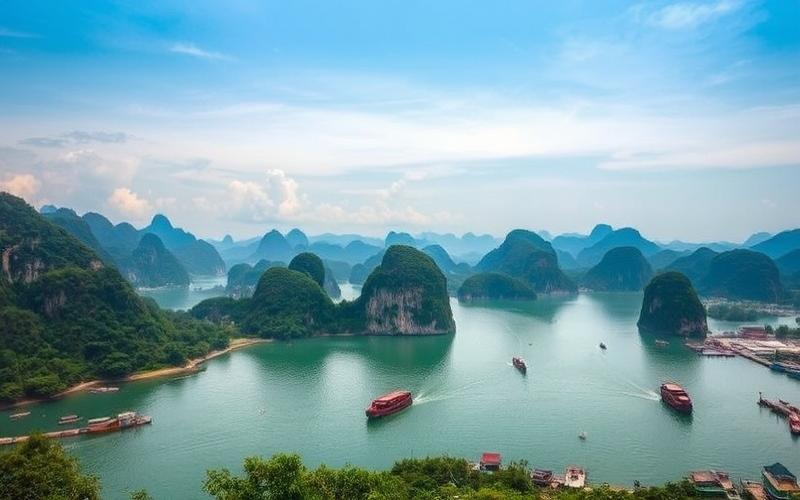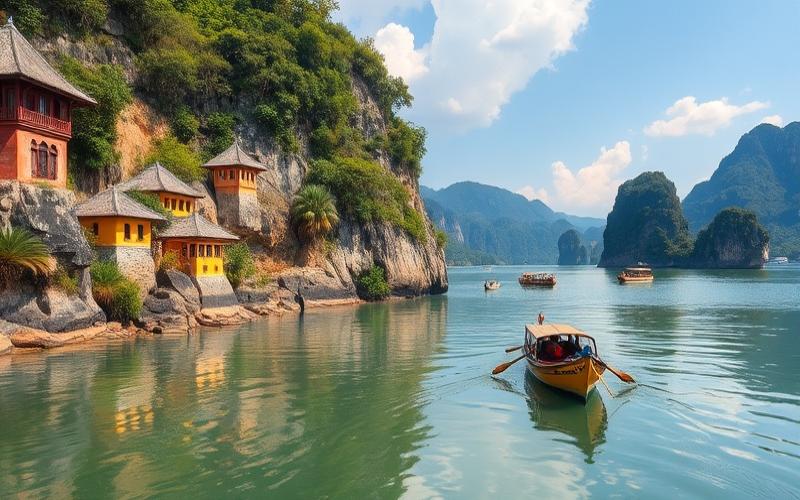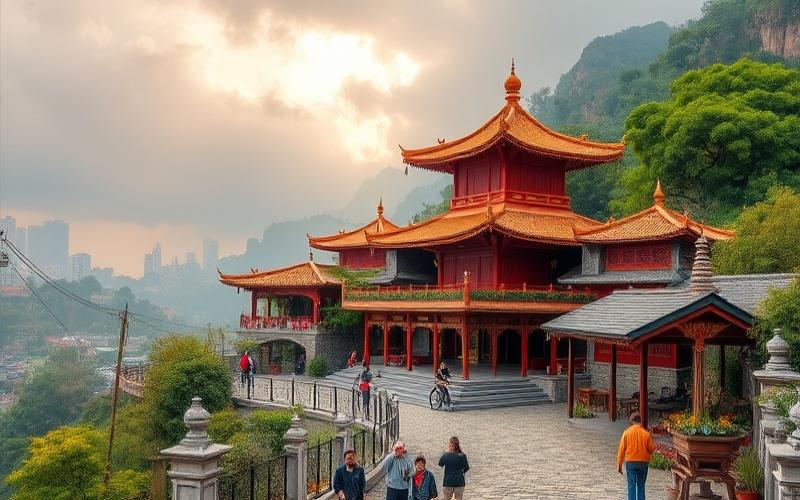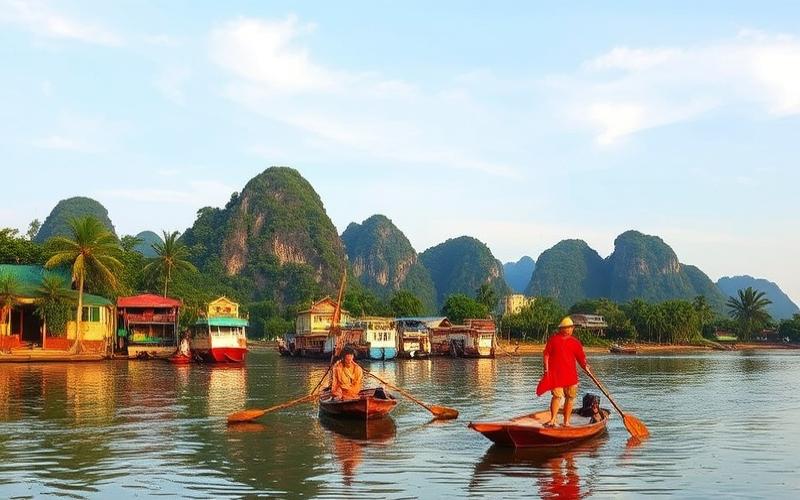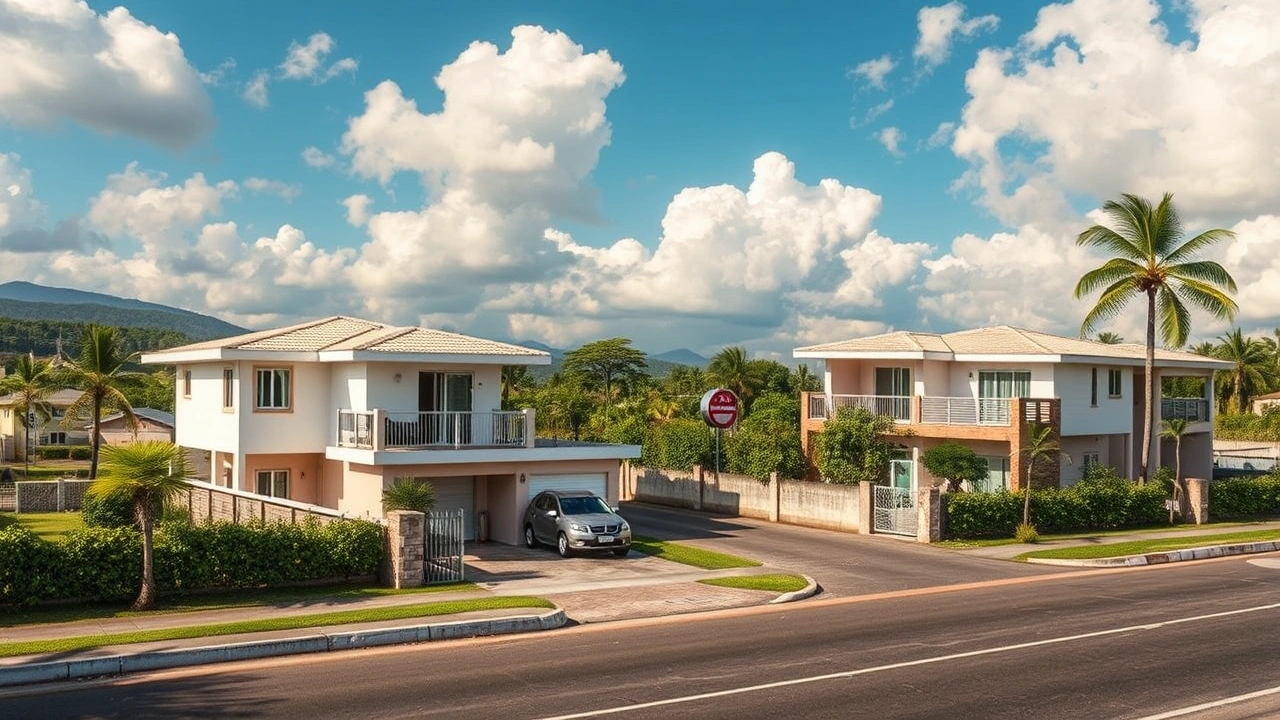
 Published on and written by Cyril Jarnias
Published on and written by Cyril Jarnias
As Vietnam continues to establish itself as an essential tourist destination in Southeast Asia, seasonal rental opportunities are experiencing spectacular growth. Whether in vibrant cities like Hanoi and Ho Chi Minh, or in breathtaking landscapes like Ha Long Bay and the terraced rice fields of Sapa, the country offers a plethora of choices for savvy investors and curious travelers.
Cultural richness, geographical diversity, and a booming economy contribute to making Vietnam not only a fascinating place to discover but also an attractive market for short-term rentals. By combining centuries-old traditions with rapid modernization, this region attracts an increasing number of international tourists each year seeking authentic and unforgettable experiences, thereby transforming seasonal rentals into a profitable and dynamic sector.
An Attractive Source of Income in Vietnam
Economic Benefits of Seasonal Rentals in Vietnam
Seasonal rentals represent a significant source of income for local property owners, particularly in major tourist areas of Vietnam such as Hanoi, Ho Chi Minh City, and coastal regions like Da Nang. The rise of international tourism, combined with the growing appeal of digital platforms, has increased the profitability of properties offered for short-term stays.
List of Main Benefits:
- Generation of recurring revenue with stable occupancy rates in major cities.
- Flexibility: ability to adjust prices based on seasonality and demand.
- Rapid property appreciation with effective management.
- Contribution to the local economy through ancillary services (cleaning, maintenance, hospitality).
Average Occupancy Rates by Tourist Region
| Region | Average Occupancy Rate | Average Annual Nights Rented | Average Annual Revenue |
| Ho Chi Minh City | 51% | 186 | VND197M (~$7,000) |
| (industry sources) |
In Ho Chi Minh City, the occupancy rate remains around 51%, equating to approximately 186 nights booked per year, with an average rental income close to $7,000/year for a typical property. The most profitable period is generally December.
In other highly sought-after coastal destinations like Da Nang or Nha Trang, these figures are comparable or even higher during peak tourist season due to the massive influx of international and domestic travelers.
Rental Market Trends & International Tourist Preferences
- Steady increase in total available accommodations on Airbnb and similar platforms (+4% year-over-year).
- Marked preference for:
- Modern apartments located downtown or near beaches.
- Accommodations offering additional services (high-speed wifi, pool).
- Authentic local experiences enhanced by multilingual communication.
The Vietnamese market is projected to reach nearly $391 million in revenue for the vacation rental sector by 2025.
Popular Platforms Used
- Airbnb
- Booking.com
- Agoda Homes
These platforms facilitate international visibility while providing property owners with advanced statistical tools and simplified booking/payment management.
Financial Analysis: Profits vs Expenses
Main Expense Sources:
- Routine maintenance (professional cleaning between stays)
- Platform fees (commission between 10% and 18%)
- Regular technical maintenance (plumbing/electrical)
Summary Comparison:
| Item | Average Revenue | Average Expenses |
| Short-term rental | ~$7,000/year | |
| Platform commission | ~15% | |
| Maintenance/cleaning | variable (~$500–$1,500/year) |
Despite these fixed costs varying by target standard, net profitability remains higher than long-term leases, provided the occupancy rate exceeds approximately 40–45%.
Local Regulatory Impact
To date, local regulations remain relatively flexible in several urban areas like Ho Chi Minh City; there are not yet strict quotas or restrictions limiting supply. However, foreign and local property owners are advised to stay informed as some provinces are currently considering increased regulation, particularly to:
- Tax these rental revenues.
- Protect access to permanent housing for Vietnamese residents.
⚠️ Legislative changes are possible; therefore, it is always advisable to regularly consult local legal updates before any new market entry.
Good to Know:
Seasonal rentals in Vietnam represent an attractive source of income for local property owners, with often high occupancy rates in sought-after regions such as Hanoi and Ho Chi Minh City, as well as beach resorts like Da Nang. International tourists, drawn by cultural diversity and picturesque landscapes, seek varied accommodations through popular platforms like Airbnb and Booking.com, supporting steady growth in the seasonal rental market. Although profits can be significant compared to maintenance and management costs, owners must navigate local regulations that can influence pricing and hosting capacity. Smart management of these properties, considering seasonal peaks and traveler preferences, can optimize returns while maintaining competitiveness in this expanding market.
The Essential Advantages of Seasonal Rentals in Vietnam
Seasonal rentals in Vietnam offer remarkable benefits for both property owners and travelers, thanks to the region’s rich territory and evolving tourism market.
Diversity of Landscapes and Tourist Destinations
Vietnam offers a wide variety of landscapes: beaches (Nha Trang, Da Nang), mountains (Sapa), historic cities (Hanoi, Hoi An), and authentic countryside.
- This diversity attracts a continuous flow of travelers throughout the year, strengthening demand in the seasonal rental market.
- Stays in homestays or rentals allow visitors to explore each region and its traditions more deeply.
| Types of Destinations | Attractiveness |
|---|---|
| Coastal | Year-round beach tourism |
| Mountains | Trekking and ecotourism |
| Cultural Cities | Historical heritage |
| Countryside/Delta | Authentic rural experiences |
Financial Benefits for Property Owners
Potential rental income higher than long-term leases: by targeting peak tourist seasons, it’s possible to increase overall annual returns.
Optimization of availability calendar: freedom for owners to use their property off-season or during low periods; ability to adjust prices based on local demand.
Simplified comparison of potential income:
| Type of Rental | Estimated Average Monthly Income* | Calendar Flexibility |
|---|---|---|
| Traditional Rental | Low to Medium | Low |
| Seasonal Rental | Medium to High | High |
(*depending on city/size/amenities)
Favorable Logistical Aspects
Daily management becomes simpler thanks to digital platforms that offer:
- Centralized booking management
- Automated tools for dynamic pricing
- Facilitated communication with diverse international clientele
Increased flexibility in choosing available dates or selecting tenant profiles
List of Major Platforms Used:
- Airbnb
- Booking.com
- Vietnamese local platforms
Growing Demand for Immersive Experiences
International tourists today seek more than just accommodation: they want to live immersive experiences with local hosts.
Homestays promote cultural exchange, regional culinary discovery, and contribute to real immersion in Vietnamese lifestyle.
The “homestay” experience often allows travelers to “interact with locals, participate in traditional activities like cooking or crafts.”
Positive Impact on Local Economy
The dynamic created by seasonal rentals directly benefits local communities:
- Direct job creation: cleaning services, ancillary services (airport transfers, excursions…)
- Indirect development: local family restaurants, independent tour guides
Home-cooked meals offered during stays also provide direct financial supplements to host families
Non-exhaustive list of boosted services:
- Cleaning & laundry
- Delivery/restaurants
- Cultural & craft activities
- Local transport & excursions
Seasonal rentals in Vietnam therefore stand out for their unique ability to combine high financial profitability for owners with the authenticity sought by an increasingly numerous international clientele. They serve as a local economic driver while sustainably enhancing Vietnam’s natural and cultural heritage.
Good to Know:
Seasonal rentals in Vietnam offer numerous advantages, particularly due to their diversity of landscapes ranging from lush rice fields to white sand beaches, attracting tourists year-round. Property owners benefit financially from rental income often higher than traditional leases, with the ability to optimize property availability according to tourist seasons. Online platforms facilitate management, offering great flexibility and meeting growing demand for immersive stays. Additionally, seasonal rentals support the local economy by generating jobs in restaurants, cleaning, and other associated tourist services.
Mastering Property Management
Understanding local regulations regarding seasonal rentals in Vietnam is essential to avoid penalties and ensure legal property operation. Since August 2024, the law explicitly prohibits short-term rentals in residential apartments in Ho Chi Minh City and other major cities. Only apartments located in mixed-use projects, such as approved condotels, can be rented for tourist purposes. Any seasonal rental activity requires obtaining appropriate licenses and registering tenants with local authorities. Property owners must therefore verify their property’s eligibility and strictly comply with registration and reporting requirements to competent authorities.
Main Regulatory Requirements:
- Seasonal rentals prohibited in standard residential apartments.
- Need for specific approval for tourist-oriented accommodations (condotels).
- Obligation to report temporary tenants to authorities.
- Risk of penalties and income loss for non-compliance.
To facilitate booking management, payments, and communication with customers, several digital tools and technologies are available:
- Property Management Systems (PMS): automation of bookings, calendar synchronization, centralized payment management.
- Online payment tools: integration of solutions like Stripe, PayPal, or local banking services to secure and automate transactions.
- Integrated messaging platforms: centralized management of customer communications (automatic responses, notifications, instant translations).
- Mobile management applications: real-time tracking of bookings, management of cleaning and maintenance tasks.
Examples of Common Tools and Technologies:
| Function | Tool/Technology |
|---|---|
| Booking Management | Airbnb, Booking.com, Agoda |
| Secure Payments | Stripe, PayPal, VNPAY |
| Customer Communication | WhatsApp, WeChat, integrated messaging |
| Task Management (cleaning, maintenance) | Properly, TurnoverBnB |
Seasonality has a major impact on the management and profitability of seasonal rentals in Vietnam, where demand varies significantly according to tourist periods (national holidays, school vacations, climate seasons). To optimize prices:
- Analyze local demand: adapt rates based on tourist peaks and local events.
- Use dynamic pricing tools: software like PriceLabs or Beyond Pricing automatically adjust prices according to supply and demand.
- Offer promotions during low season: to maintain high occupancy rates and attract customers during off-peak periods.
Tips for Managing Seasonality and Pricing:
- Monitor local event calendars.
- Regularly update rates.
- Offer discounts for long stays or last-minute bookings during low season.
Regular maintenance and cleaning service management are essential to guarantee high-quality standards and retain customers:
- Schedule regular property inspections.
- Implement checklists for cleaning and maintenance.
- Work with reliable local providers or use specialized platforms to coordinate cleaning.
- Collect customer feedback to identify areas for improvement.
Practical Tips for Maintenance and Cleaning:
- Establish a cleaning schedule between each rental.
- Use appropriate products and professional-grade quality.
- Train staff in hospitality standards.
In Vietnam, several popular platforms allow reaching a wide audience of potential tenants:
| Platform | Strengths |
|---|---|
| Airbnb | Broad international visibility, integrated management tools |
| Booking.com | Strong local and international presence, flexible rate management |
| Agoda Homes | Specialization in Asia, local payments |
| Luxstay | Vietnamese platform, adapted to local market |
Good to Know:
To effectively manage seasonal rental properties in Vietnam, it’s crucial to master local regulations, particularly by obtaining necessary licenses and registering correctly. Digital tools like Airbnb or Booking.com facilitate booking management, payments, and communication with customers, while optimizing visibility to potential tenants. Seasonality influences demand, so adjusting prices accordingly is essential to maximize profits. Regular maintenance and quality cleaning services ensure attractive accommodations. Leveraging local platforms like Luxstay can also increase your appeal in the Vietnamese market.
KEY TAKEAWAYS
- Scrupulously respect local legislation and obtain all necessary authorizations.
- Automate management using digital tools to save time and limit errors.
- Adapt pricing strategy to seasonality to maximize revenue.
- Prioritize maintenance and cleanliness to maintain high standards and obtain good customer reviews.
- Diversify presence across multiple platforms to reach maximum tenants.
Understanding Local Regulations
Local Regulations in Vietnam for Seasonal Rentals
Foreign Ownership Laws
- Foreigners can acquire certain types of real estate in Vietnam, mainly apartments in state-approved projects.
- Land purchase remains prohibited for non-nationals; only land use rights for a determined period (often 50 years renewable) are possible through certain contracts.
Licenses Required to Rent Properties
- Seasonal rentals require declaration to local authorities (People’s Committee of the ward or district).
- A commercial operating license may be required, especially if the accommodation is regularly offered to tourist clientele.
- For residences in collective buildings, check the co-ownership regulations: some explicitly prohibit short-term rentals.
Taxes Applicable to Property Owners and Tenants
| Type of Tax | Vietnamese Resident Owner | Foreign Owner | Tenant |
|---|---|---|---|
| Rental Income Tax | Yes (progressive rate based on income) | Yes (with specific tax obligations) | No |
| Value Added Tax | May apply depending on tax status | May apply | No |
| Property Tax | Yes | Yes | No |
For any regular activity, tax registration is mandatory. Non-compliance exposes to adjustments and fines.
Restrictions Imposed by Certain Municipalities
Ho Chi Minh City:
- Since March 2025, strict prohibition of short-term rentals in residential apartments, particularly via Airbnb or similar platforms.
- This measure aims to reserve this market for licensed operators and avoid undeclared wild rentals.
- The term “short-term” has not yet received an official precise definition but concerns all classic forms of tourist rentals.
Hanoi:
Regulations more flexible than Ho Chi Minh City but trend toward strengthened administrative control localized in certain central tourist districts.
Rural or Tourist Areas:
Generally less strict; several provinces actively promote private tourist offerings subject to simple registration with the local People’s Committee.
Differences Between Major Cities and Rural/Tourist Regions
| Criteria | Hanoi & Ho Chi Minh City | Rural/Tourist Regions |
|---|---|---|
| Urban Planning Rules | More restrictive | Less constraining |
| Administrative Control | Frequent | Sometimes relaxed |
| Rental via External Platforms | Prohibited/heavily regulated | Sometimes tolerated |
Practical Tips for Potential Owners
Systematically verify local regulations and any co-ownership rules before any seasonal rental investment.
- Register with the competent People’s Committee with all required supporting documents (property title, standard lease contract…).
- Open a specific Vietnamese tax number;
- Maintain clear accounting;
- Systematically declare all rental income;
- Frequently inquire about municipal regulatory changes that can evolve quickly.
Scrupulously following these procedures strongly limits the risk of administrative or tax fines.
Good to Know:
Regarding seasonal rentals in Vietnam, it’s crucial to understand local regulations that vary between major cities and rural areas. Foreigners can own real estate in Vietnam, but their ownership is limited to a 50-year land lease, renewable. Property owners must obtain a specific license to rent their properties for tourist purposes, and this requirement may differ between Hanoi, Ho Chi Minh City, and other regions. Owners are subject to a 10% tax on rental income comprising both income tax and VAT, while some localities impose additional local taxes. Strict laws in Hanoi and Ho Chi Minh City may be less rigorous in tourist regions, but it’s always prudent for potential owners to consult a local lawyer to avoid any violations. Furthermore, some municipalities impose specific restrictions on the types of properties that can be rented for tourist purposes, making it essential to verify local rules before engaging in seasonal rentals.
Disclaimer: The information provided on this website is for informational purposes only and does not constitute financial, legal, or professional advice. We encourage you to consult qualified experts before making any investment, real estate, or expatriation decisions. Although we strive to maintain up-to-date and accurate information, we do not guarantee the completeness, accuracy, or timeliness of the proposed content. As investment and expatriation involve risks, we disclaim any liability for potential losses or damages arising from the use of this site. Your use of this site confirms your acceptance of these terms and your understanding of the associated risks.
















